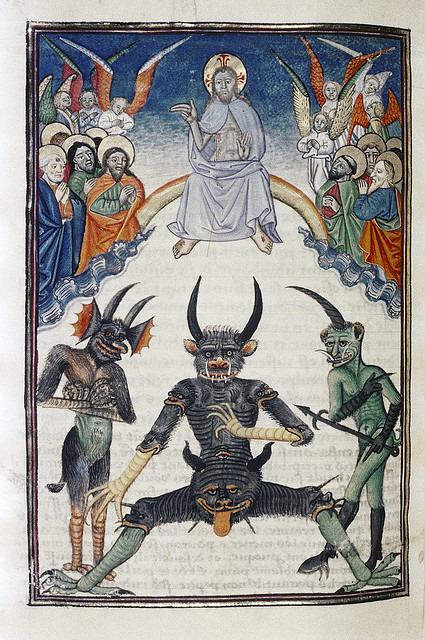 Please join the Theology Workshop for our first regular presentation of our spring quarter theme, “Imagining Evil.” Matt Vanderpoel, PhD Student in History of Christianity, will present on Augustinian exegesis and medieval demonology. Kyle Rader, PhD Candidate in Theology, will respond.
Please join the Theology Workshop for our first regular presentation of our spring quarter theme, “Imagining Evil.” Matt Vanderpoel, PhD Student in History of Christianity, will present on Augustinian exegesis and medieval demonology. Kyle Rader, PhD Candidate in Theology, will respond.
Thursday, April 18th
12:00 – 1:30 pm
Swift 208
Abstract:
Augustine, over the course of his Genesis commentaries, explicitly develops the devil as the antitype for proper exegesis. Thus, as his exegetical strategies and prescriptions change in the Literal Commentary, the devil becomes radically effaced. This interpretation is transmitted throughout the Middle Ages, but it is substantively explored by Hugh of St. Victor and the Lombard in the 12th century. As they continue the process of reading the devil out of Genesis, nonetheless, they mitigate the distance between the diabolic and the human. This will be tentatively interrogated as a possible source for and influence on the resurgence of demonology in the 13th and 14th centuries.
A light lunch will be served. No preparation is expected of workshop attendees. Persons with a disability who would request assistance, please contact Aaron in advance at athollander@uchicago.edu.
Spring 2013: Imagining Evil
This quarter, the Theology Workshop is inviting conversation on the ways that “evil” is conceived, characterized or personified, ascribed to selves and others, resisted, and deconstructed both by first-order religious practices or discourses and by the analytical disciplines attending to them. The category of evil (here, inclusive of relatable terms from various cultures) is among the most elementary centers of gravity for theological inquiry and response. Accounts of the generation of the cosmos and of human nature and societies often reckon with the felt presence of evil entities and perverse forms of understanding. How religious practices and discourses construe evil—attending to its causes, repositories, ritual or artistic significance, and corrosive powers, as well as the means for subduing it—has very real social, political, and religious consequences.
Over the course of the quarter, then, we aim to inspire a conversation that examines the category of evil as an arena in which religious imagination, ethical motivation, and communal dynamics are constantly colliding and conditioning one another. We invite submissions of work in progress, which explore or expand the theme of “Imagining Evil.” These might include, but are in no way limited to, discussion of issues such as:
• Names for evil(s); defining the terms and envisioning the stakes;
• The lexicon, logic, metaphor, and rhetoric for describing evil in a religious literature; imagining a world or taking a religious position “beyond good and evil”;
• The representation of evil beings, places, or practices in non-textual media (painting, film, music, dance, shrines, etc.); evil and aesthetics;
• Ritual reckoning with evil (e.g. sacrifice, penance, exorcism, warding, blessing);
• The relation between conceptions of evil and understandings of death, suffering, ignorance, or tragedy;
• Problems with theodicy; constructive offerings in theodicy;
• The being or nonbeing of evil; evil as personal/personified or impersonal; the damnation, transformation, reformation, or redemption of participants in evil;
• Ascription of evil to others, or depiction of evil with the characteristics of others; religious violence and justifications for violence; the invocation of evil in political discourse and institutions;
• Fascination with or possession by evil; the attractiveness or seductiveness of evil
• Horror as a religious category; mythological or ethical monsters
• Evil as an academic concern; when is it a useful or non-useful category, and for which disciplines?

 Please join the Theology Workshop for our first regular presentation of our spring quarter theme, “Imagining Evil.” Matt Vanderpoel, PhD Student in History of Christianity, will present on Augustinian exegesis and medieval demonology. Kyle Rader, PhD Candidate in Theology, will respond.
Please join the Theology Workshop for our first regular presentation of our spring quarter theme, “Imagining Evil.” Matt Vanderpoel, PhD Student in History of Christianity, will present on Augustinian exegesis and medieval demonology. Kyle Rader, PhD Candidate in Theology, will respond.